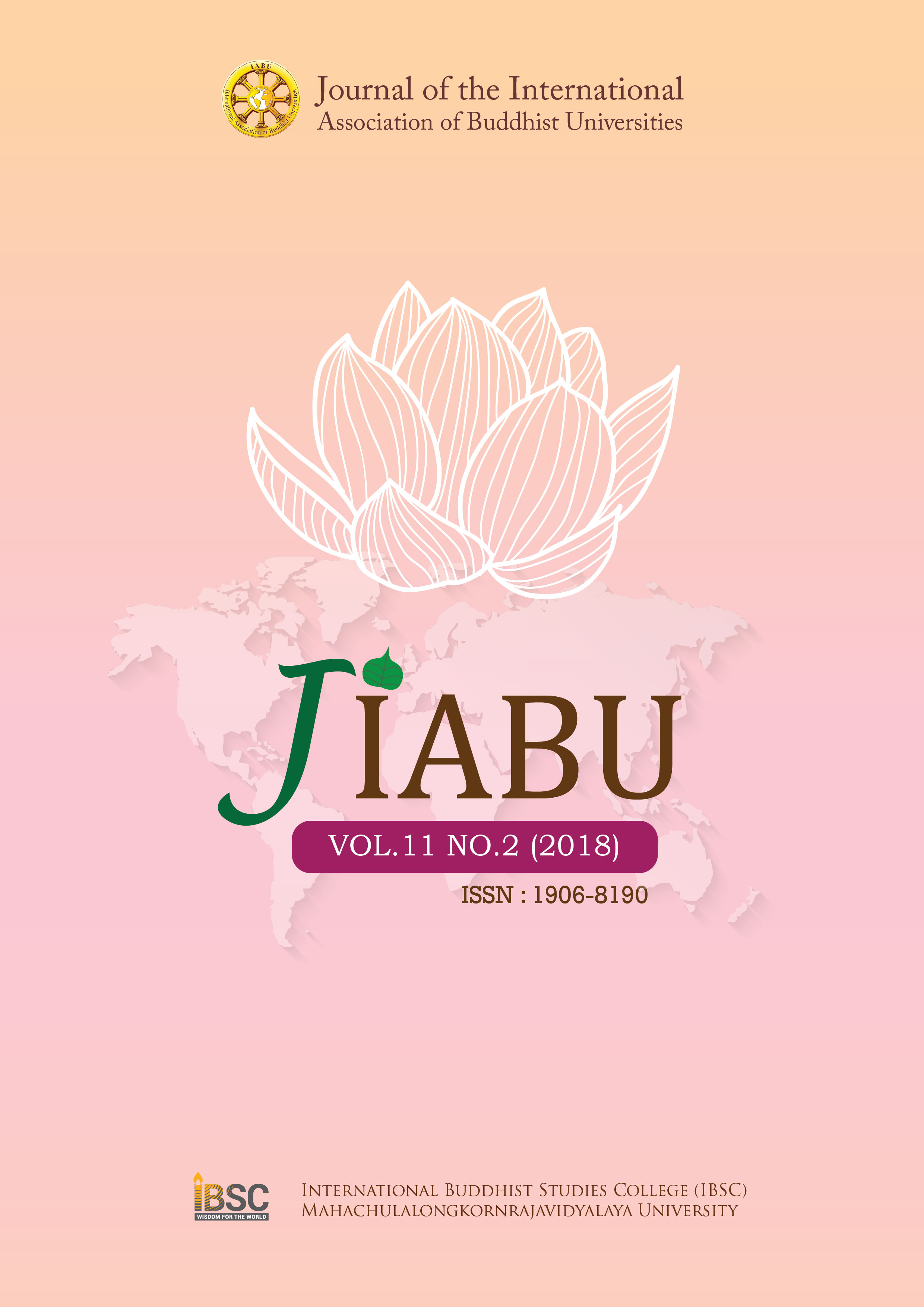An Analytical Study of The Seven Factors of Enlightenment in Bojjhaṇga Sutta as a Protection Against Sickness in Theravāda Buddhist Perspective
Main Article Content
Abstract
This article aims to promote understanding of the meanings and types of the seven
factors of enlightenment (sattabojjhaṇga), how we contemplate these factors according to the
teachings of the Enlightened One, how they cure all sickness according to the Pāḷi Canon,
and why they can cure the sickness in Theravāda Buddhist perspective.
From this study, it is found that the term Bojjhaṇga is derived from two words: bodhi
and aṇga. Bodhi means enlightenment or insight of the realization of the Four Noble Truths:
the Noble Truth of Suffering, the Noble Truth of the Origin of Suffering, the Noble Truth of the
Cessation of Suffering, and the Noble Truth of the Path Leading to the Cessation of Suffering.
Aṇga means factors or limbs. Therefore Bojjhaṇga means the factors of enlightenment. The
development of the factors of enlightenment causes the knowledge leading to wisdom and
peace to arise. So these factors are called the factors of perfected knowledge. If a monk
cultivates and develops the seven factors of enlightenment, he inclines to Nibbāna, tends to
Nibbāna and walks towards Nibbāna.
Firstly, the findings show the meaning of the seven factors of enlightenment and
the types of the seven factors of enlightenment. Secondly, the research examined the
application of these factors by the contemplation of the seven factors of enlightenment. Finally,
the article touched upon two kinds of sickness, two kinds of medicines, and bojjhaṇgas as
the medical healing applied by the development of these factors. Therefore the seven factors
of enlightenment are one of the categories of spiritual qualities frequently mentioned by the
Buddha as very beneficial for spiritual development.
Article Details
Views and opinions expressed in the articles published by The Journal of the International Association of Buddhist Universities (JIABU), are of responsibility by such authors but not the editors and do not necessarily reflect those of the editors.
References
Buddhist Publication Society, Kandy, Sri Lanka: (1985)
Ashin Janakābhivaṁsa, “Abhidhammā in Daily Life”, tr. by U Ko Lay, Mahāgandhāyone
Monastery, Mandalay, Myanmar, (second edition-1999).
Ajahn, Thiradhammo, “Contemplations on the Seven Factors of Awakening”, Aruna
Publications, UK, (2012).
Anālayo, Satipaṭṭhāna (The Direct Path to Realization), (Printing House, Bangkok, 2003).
Bodhi, Bhikkhu: (trs.). The Connected Discourses of the Buddha, A New Translation of
the Samyutta Nikāya, USA, 2000.
Bodhi, Bhikkhu: (trs.). The Numerical Discourses of the Buddha, A Translation of the Aṇ
guttara Nikāya, Wisdom Publications, USA, 2012.
Bhikkhu Bodhi: (trs.). A Comprehensive Manual of Abhidhammā, (Buddhist Publication
Society, Sri Lanka, 2000), p.333.
Bhadantācariya Buddhaghosa, The Path of Purification (Visuddhimagga), tr. by Bhikkhu
Ñāṇamoli, Buddhist Publication Society, Kandy, Sri Lanka, 1975.
Bhikkhu, Ñānamoli, (trs),_ “The Path of Purification (Visuddhimagga)”, Buddhist
Publication Society, Candy, Sri Lanka: (1956, 1964, 1991, 2010).
Bhante Henepola Gunaratana, “Beyond Mindfulness in Plain English”, (An Introductory
Guide to Deeper States of Meditation), Wisdom Publication, Boston: 2009.
Bhikkhu Ñāṇamoli, A Pali-English Glossary of Buddhist Technical Terms, (Buddhist
Publication Society, Kandy, Sri Lanka, 1994).
Chanmyay, Myaing Sayadaw, “The Bojjhaṇga: Medicine That Makes All Diseases
Disappear”, (Translated from Burmese by Ven. Ariya Ñānī, (KualaLumpur,
Malaysia: (2008).
Cowell E. B. Ed: The Jātaka or Stories of the Buddha’s Former Births, translated from the
Pāli by various hand. Vol.VI. Cambridge, At the University Press, 1979.
Daw Mya, Tin, The Dhammapada: Verses and Stories, Editorial Committee, Burma
Tipitaka Association, Yangon, Myanmar, 1986.
Dr. Mehm Tin Mon, “The Essence of Buddha Abhidhamma”, Yangon, Myanmar: (2015),
Third Edition.
Dr. Nandamālābhivaṃsa, Fundamental Abhidhamma, Part 1, (Center of Buddhist Studies,
Sagaing Hills, Myanmar, 1997).
Editor Phrakru Samu Lom, Buddhism Handbook (Intermediate Level), (Atammayatarama
Buddhist Monastery, London, 2012).
Hermann Olderberg, Thera and Therīgāthā, (Pali Text Society, London, 1883).
Maurice, Walshe: (trs.). The Long Discourses of the Buddha, A Translation of the Dīgha
Nikāya. Wisdom Publications, Boston.
Maung Tin, M.A, (trs), “The Expositor hasālinī)_t_(At “, Pali Text Society, London.
Ñānamoli Bhikkhu; Bodhi, Bhikkhu: (trs.). The Middle Length Discourses of The Buddha,
A Translation of the Majjhima Nikāya. Kandy, Sri Lanka. BPS, 1995.
Nyanaponika, Mahāthera, (trs), “A Manual of The Requisites of Enlightenment
(Bodhipakkhiya-Dīpanī)”, Candy, Cylon: (1971).
Nina van Gorkom, Cetasikas, (Ehipassiko Buddhist Meditation Society, Penang,
Malaysia).
Pasela, Bhikkhu, “The Debate of King Milinda”, Association of Insight Meditation, UK,
(2000).
Piyadassi, Thera, “The Book of Protection”, Buddhist Publication Society, Candy, Sri
Lanka, (1999).
Payadassi, Thera, The Seven Factors of Enlightenment, Satta Bojjhanga, BPS, Kandy, Sri
Lanka, 1960, 1980.
Sanu Mahatthanadull, Ph.D, “Teaching Document”, IBSC, MCU, Ayutthaya, Thailand,
2016.
Sayadaw U Sīlānanda, PARITTA PĀḶI PROTECTIVE VERSES, (USA,1998).
S.N.Goenka, Mahāsatipaññhāna Sutta (The Great Discourse on the Establishing of
Awareness), (Vipassanā Research Institute VRI, Igatpuri, India, 1985).
Soma Thera, The Way of Mindfulness (The Satipaññhāna Sutta and Its Commentary),
(Kandy, Sri Lanka, 1998).
T. W. Rhys Davids, Pali-English Dictionary, (Pali Text Society, London, 1925).
Thanissaro Bhikkhu, The Wings to Awakening, (1996).
Uda, Eriyagama, Dhammajīva, The Seven Factors of Enlightenment, Sri Lanka.
U Jotika, U Dhamminda, (trs), hāna_t_Mahāsatipat Sutta (The Greater Discourse on Steadfast
Mindfulness), Myanmar, (1986).
Ven. Nyanatiloka, Buddhist Dictionary (A Manual of Buddhist Terms and Doctrines),
(Buddhist Publication Society, Kandy, Sri Lanka, 2004).
Venerable Sujīva, The Tree of Wisdom (The River of No Return), (Malaysia, 2009).
Ven. Dr. Madawela Punnaji Maha Thera, Ariyamagga Bhavana (The Sublime Eightfold
Way, (Malaysia, 2011).
Venerable Ledi Sayādaw, The Requisites of Enlightenment (Bodhipakkhiya Dīpanī), tr. by
Sein Nyo Tun, (Buddhist Publication Society, Kandy, Sri Lanka, 1971).
Venerable, Ledi Sayādaw, “Magganga Dipanī” (The Manual of the Path Factors)
(Burmese script), Yangon, Myanmar, (1986).


